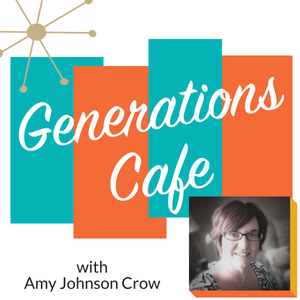
Generations Cafe
Amy Johnson Crow
Genealogy and Family History
- 6 minutes 27 seconds072 - When Ancestors Changed Names16 April 2022, 11:00 am
- 7 minutes 9 seconds071 - Get Ready for the 1950 Census
The 1950 census release will be unlike any other US census that has come before. Learn what you need to do to get ready to find your ancestors when the census goes public on April 1.
The show notes also have a link to a video with a step-by-step tutorial on identifying enumerations districts, as well as how you can help with the volunteer indexing project.
Show notes: AmyJohnsonCrow.com/71
13 March 2022, 10:30 am - 8 minutes 18 seconds070 - FindAGrave's Major Update: What You Need to Know
In January 2022, FindAGrave made two major updates. The first impacts memorials created for the recently deceased -- a change that the genealogy community has been requesting for years.
The second is a change to the relationships that require a transfer when a family member asks to manage a memorial. This change can help more family members manage the memorials of their loved ones.
The show notes include links to FindAGrave's updated support pages.
You can find the show notes at AmyJohnsonCrow.com/70
13 January 2022, 1:19 pm - 10 minutes 47 seconds069 - Genealogy Mistakes that Everyone Makes (and How to Avoid Them)
Beginners and experienced genealogists alike make these genealogy mistakes. In this episode, Amy Johnson Crow explains what they are, how they hurt your research, and how to avoid them.
She also shares her top tip for genealogy success with less frustration.
You can find the show notes at AmyJohnsonCrow.com/69
6 January 2022, 10:30 am - 11 minutes 6 seconds068 - 5 Things to Know About DNA Testing for Genealogy
DNA is great for genealogy, and it goes way beyond the ethnicity estimate -- and what is that estimate even telling you anyhow?! (Spoiler alert: don't get a tattoo based on what that estimate says. It will change!)
Think you have Native American ancestry and it didn't show up in your ethnicity estimate? There's a reason for that.
You might be surprised to learn that you and your sibling likely won't have identical ethnicity estimates or even have the exact same DNA matches.
You can find the show notes at https://www.amyjohnsoncrow.com/68
2 December 2021, 2:00 pm - 13 minutes 1 second067 - How to Find Your Civil War Ancestor
Millions of Americans descend from a Civil War veteran. But how can you identify which one of your ancestors served (if any)? In this episode, Amy will show you easy steps for finding clues about service. You'll also see how you can identify your ancestor's regiment, which is key to getting into more military records.
You can find the show notes, along with links to everything mentioned in this episode at AmyJohnsonCrow.com/67
11 November 2021, 3:45 pm - 12 minutes 37 seconds066 - Is Ancestry Missing Your Ancestors?It's frustrating to search on Ancestry and not get any results, especially when you know the record should exist. No matter how you change your search, you just can't find it.
The issue might not be in how you're searching. It might be a matter of Ancestry doesn't have the record. Unfortunately, it's hard to tell what Ancestry doesn't have.
In this episode, Amy shows two ways to spot gaps in Ancestry's collections, including a creative way of using the "Browse this Collection" feature.
There's also an accompanying video, which you can see on the show notes at AmyJohnsonCrow.com/66.
Save yourself a lot of frustration (and wrong conclusions!) by spotting these gaps in Ancestry's collections!
24 October 2021, 9:30 am - 33 minutes 45 seconds065 - Remembering the Wilmington Coup of 1898
You might have heard in the news recently about commemorating the centennial of the Tulsa Massacre of 1921 (the destruction of "Black Wall Street.") You might — or might not — be surprised that Tulsa isn't the only event of its kind.
In 1898, the elected government of Wilmington, North Carolina, was overthrown by whites who were outraged at the success of Blacks in Wilmington. This uprising resulted in deaths, banishments, and the destruction of numerous businesses in town. It decimated the Black middle class in Wilmington for generations.
In this episode, Tim Pinnick, a noted genealogist and historian, explains the efforts underway to study the people who were there at the time. What happened to the families of those who were killed? What of the banished and their families?
Not only does Tim explain what happened in 1898, but how you can help with the research efforts.
You can find the show notes, including links to numerous resources, at AmyJohnsonCrow.com/65.
10 June 2021, 12:49 pm - 9 minutes 49 seconds064 - Exploring Military Cemeteries
Honoring those who died in service to their country or after their service is one of the most sacred duties of a country. Finding the burial place of a veteran ancestor can be a deeply moving experience.
In this episode of Generations Cafe, we explore the history of military cemeteries in the United States, as well as some resources you can use to find where your military ancestors are buried.
You can find the show notes with links to all of the resources at AmyJohnsonCrow.com/64.
23 May 2021, 8:30 am - 16 minutes 26 seconds063 - What Kind of Online Family Tree Is Right for You?
Putting your family tree online has some great benefits, including connecting with cousins, sorting DNA matches, and even preserving your research. But did you know that there are different kinds of online family trees?
In this episode, Amy Johnson Crow explores the 3 main kinds of online family trees: individual trees on other sites, individual trees on your own website, and collaborative trees. Each one has its plusses and minuses. Take a listen on how to choose the one that best meets your needs.
You can find the show notes for this episode, including links to all of the websites mentioned, at amyjohnsoncrow.com/63.
9 May 2021, 8:30 am - 15 minutes 2 seconds062 - How to Get All the Clues From Genealogy Sources
If you're pulling out the one fact that you were looking for in a genealogy source, jotting it down, and then moving on... you're probably leaving a lot behind.
Taking a closer look at that source might help you discover the answer you were looking for. Even if it doesn't spell out the answer, that deeper dive will likely give you ideas on other places you can look.
In this episode, Amy Johnson Crow explains how knowing more about the type of record you're using can help in your search. She'll also share tips about pulling out more information from specific records, including an overlooked type of word.
11 April 2021, 8:30 am - More Episodes? Get the App
Your feedback is valuable to us. Should you encounter any bugs, glitches, lack of functionality or other problems, please email us on [email protected] or join Moon.FM Telegram Group where you can talk directly to the dev team who are happy to answer any queries.
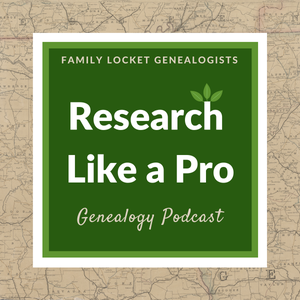 The Research Like a Pro Genealogy Podcast
The Research Like a Pro Genealogy Podcast
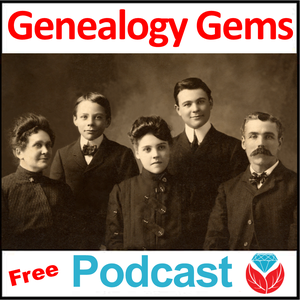 The Genealogy Gems Podcast with Lisa Louise Cooke - Your Family History Show
The Genealogy Gems Podcast with Lisa Louise Cooke - Your Family History Show
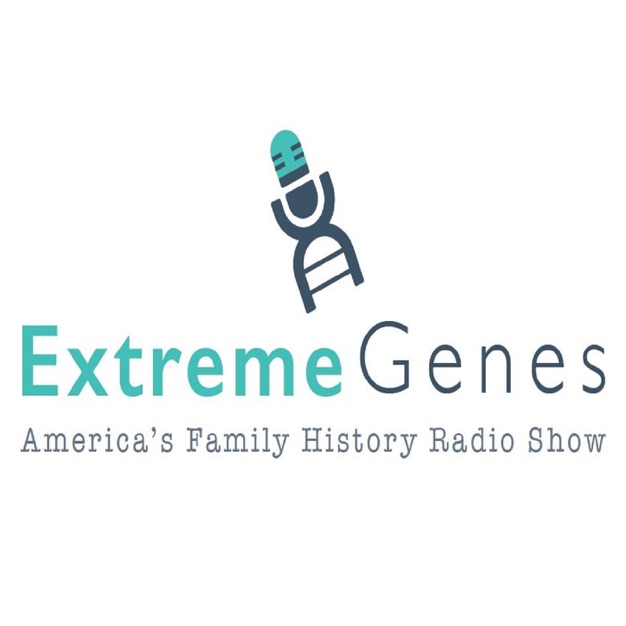 Extreme Genes - America's Family History and Genealogy Radio Show & Podcast
Extreme Genes - America's Family History and Genealogy Radio Show & Podcast
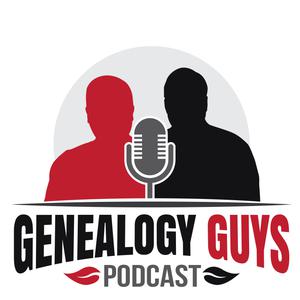 The Genealogy Guys Podcast & Genealogy Connection
The Genealogy Guys Podcast & Genealogy Connection
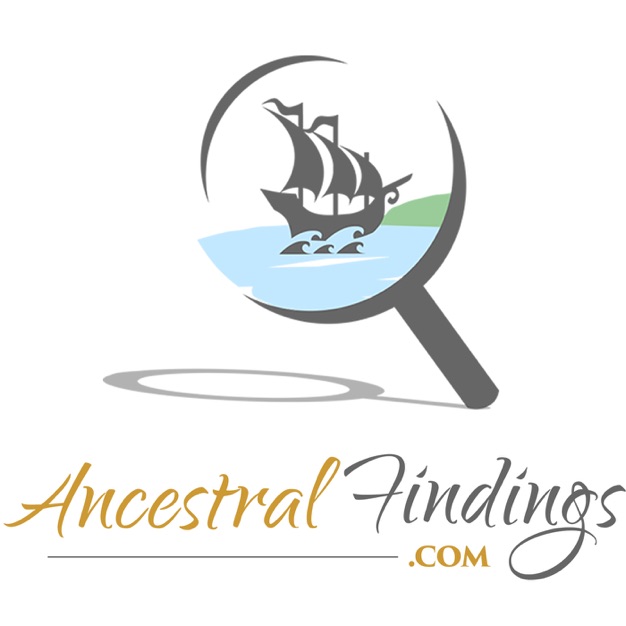 Ancestral Findings - Genealogy Podcast
Ancestral Findings - Genealogy Podcast